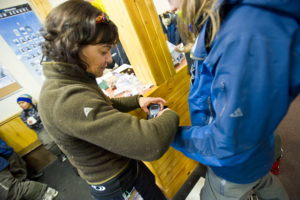Dr. Delia Roberts studies how nutrition can prevent injuries at work. She found that workers who change their diets can improve performance that very day.

Photo credit: David R. Gluns
Drink more water. Eat less sugar. That’s part of what Health Canada recommends in its updated food guide.
This made me think of and reach out to Dr. Delia Roberts, a B.C. researcher who studies the connection between fitness, nutrition, and workplace injuries.
Delia has studied physicians, helicopter pilots, mountain guides, truck drivers, tree planters, and more. Her research shows that workers who manage their blood sugar levels during the day can significantly reduce their risk of getting injured on the job.
“I see the same sort of numbers over and over, in every industry I look at,” Delia says. “Essentially you can cut your injury rate nearly in half simply by eating well.”
What you eat affects how you do
Fluctuations in blood sugar are shown to slow reflexes and impair our ability to assess risk.
Delia studies this effect by documenting what groups of workers consume. For two days, they eat and drink as usual. Then for another two days, they follow Delia’s regimen (which includes increased hydration, fewer sugars). Delia documents the workers’ blood glucose, temperature, urine composition, and other physical indicators.
Then she tests how workers perform on physical tasks — like reaction times, pattern recognition, and response to unexpected visual stimuli. When she correlates diet with physical performance, she sees that workers consistently perform better when they aren’t dehydrated and eat a diet that stabilizes blood sugar.
What’s more, workers who make these changes to their diets experience performance improvement that very day. It’s not like going to the gym and seeing your fitness level improve gradually.
Says Delia: “This isn’t a long-term thing. This is right now — today. That’s the power of it.”
Fit for work
Based on her extensive research, Delia has created programs for the forestry, trucking, and ski hill industries. I wrote about her Fit to Plant and Fit for Snow programs in my posts New tools for preventing silviculture injuries and New program helps ski hill workers combat injuries.
To read some of Delia’s specific nutritional recommendations, see this Canada West Ski Areas Association blog post, Employee Safety: The Nutrition Factor.


